Book contents
- Fiscal Capacity and the Colonial State in Asia and Africa, c. 1850–1960
- Cambridge Studies in Economic History
- Fiscal Capacity and the Colonial State in Asia and Africa, c. 1850–1960
- Copyright page
- Contents
- Figures and Maps
- Tables
- Contributors
- Acknowledgements
- 1 Fiscal Capacity and the Colonial State: Lessons from a Comparative Perspective
- 2 Towards a Modern Fiscal State in Southeast Asia, c. 1900–60
- 3 Why Was British India a Limited State?
- 4 Colonial and Indigenous Institutions in the Fiscal Development of French Indochina
- 5 Fiscal Development in Taiwan, Korea and Manchuria: Was Japanese Colonialism Different?
- 6 From Coast to Hinterland: Fiscal Capacity Building in British and French West Africa, c. 1880–1960
- 7 New Colonies, Old Tools: Building Fiscal Systems in East and Central Africa
- 8 Local Conditions and Metropolitan Visions: Fiscal Policies and Practices in Portuguese Africa, c. 1850–1970
- 9 How Mineral Discoveries Shaped the Fiscal System of South Africa
- Index
- References
9 - How Mineral Discoveries Shaped the Fiscal System of South Africa
Published online by Cambridge University Press: 15 November 2019
- Fiscal Capacity and the Colonial State in Asia and Africa, c. 1850–1960
- Cambridge Studies in Economic History
- Fiscal Capacity and the Colonial State in Asia and Africa, c. 1850–1960
- Copyright page
- Contents
- Figures and Maps
- Tables
- Contributors
- Acknowledgements
- 1 Fiscal Capacity and the Colonial State: Lessons from a Comparative Perspective
- 2 Towards a Modern Fiscal State in Southeast Asia, c. 1900–60
- 3 Why Was British India a Limited State?
- 4 Colonial and Indigenous Institutions in the Fiscal Development of French Indochina
- 5 Fiscal Development in Taiwan, Korea and Manchuria: Was Japanese Colonialism Different?
- 6 From Coast to Hinterland: Fiscal Capacity Building in British and French West Africa, c. 1880–1960
- 7 New Colonies, Old Tools: Building Fiscal Systems in East and Central Africa
- 8 Local Conditions and Metropolitan Visions: Fiscal Policies and Practices in Portuguese Africa, c. 1850–1970
- 9 How Mineral Discoveries Shaped the Fiscal System of South Africa
- Index
- References
Summary
South Africa made remarkable progress from 1850 to 1961 with the establishment of a ‘modern’ fiscal state. This chapter shows that the discovery of diamonds and gold in the second half of 19th century facilitated the modernization of the country's fiscal system by providing the impetus for modern economic growth and by generating vast resources for the financing of infrastructure and essential social services. It also identifies two consequences of apartheid that negated vital potential benefits of the fiscal modernization process: the state could not achieve the legitimacy needed for political stability and long-term economic development, and the economic diversification that is essential for sustained economic progress in economies built on the extraction of exhaustible resources was thwarted by the debilitating effects of apartheid on policy priorities and the country's skills base. The main conclusion of the chapter therefore is that apartheid prevented South Africa from capitalizing on the opportunities afforded by its mineral wealth and otherwise solid governance foundations.
- Type
- Chapter
- Information
- Publisher: Cambridge University PressPrint publication year: 2019



